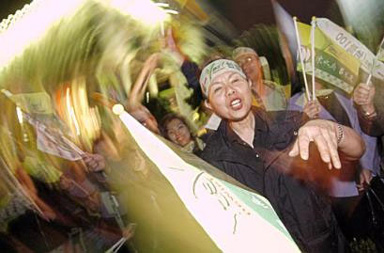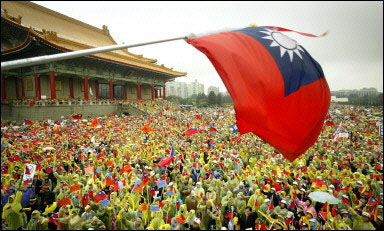No to Violence and Guile
|
A Young Democracy in Turmoil Supporters of President Chen Shui-Bien celebrated their man's survival of an apparent assassination attempt. 20 March saw the fourth direct presidential election in Taiwan since 1987, when the regime of the Kuomingtang (KMT), or Nationalist Party, ended martial law decreed by its late dictator Chiang Kai-Shek in 1949, giving way to multiple-party elections. (AP Photo by David Longstreath) Chen, of the Democratic Progressive Party (DPP), was re-elected to a second term by a hair: 29,518 votes, or 0.2% of the 13,251,719 ballots cast, while 337,297 ballots were deemed invalid by election officials. (6,471,970 votes, or 50.1%, went to the DPP; the opposition took 6,442,452 votes or 49.9%. Turnout was 80%.) Chen's near-nonexistent mandate was further undermined by the defeat of Taiwan's first-ever referendum vote that he initiated, on the question of whether Taiwan should bolster its military defenses against China. Even after it was rephrased (originally it asked whether China should remove the 480 or so missiles aimed at Taiwan from just 150 miles away across the Taiwan Strait), the measure was decried by many as demagoguery, and as a provocation against the regional bully that frequently threatened to reclaim the island by force. The referendum was invalidated when 55% of the voters chose not to participate; amongst the 45% who did, 90% voted in its favor.
The KMT opponent, former Vice President Lien Chan, immediately demanded the votes to be nullified. Protest rallies stood before the presidential palace daily since the election, demanding vote recount and an independent investigation into the shooting. On 27 March, the rally in rainy Taipei swelled to nearly 500,000 people, replete with slick light shows and large video screens provided by the KMT supporters (AFP photo by Peter Parks). |
I started writing this commentary on the eve of the latest presidential election in Taiwan. The vote took place as scheduled, within twenty-four hours of President Chen Shui-Bien and VP Annette Lu surviving a shooting attack during the last day of campaigning. At this time, the world was still feeling the shock of the 11 March train attacks in Madrid, which killed 190 people, injured more than 1,500 and occurred exactly three days before a general election. The attacks, now blamed squarely on Islamic extremists connected to al-Qaeda, were perceived as revenge against Spain's participation in the Iraq war. By a 42% to 38% margin in a 77% turnout, the Socialists defeated the ruling Popular Party of Jose Maria Aznar, who took Spain to war in Iraq despite overwhelming public disapproval. Upon becoming the Prime Minister-elect, Jose Luis Rodriguez Zapatero had vowed to withdraw all 1,300 Spanish troops from Iraq by the end of June, lest their presence be required by a new UN mandate. These harrowing events are being interpreted wildly by all sides of their respective disputes. In Spain, those opposed to the war in Iraq hailed their electoral victory as a step taken to lessen the aggravation of global Islamic terrorism, while their dissenters accused them of appeasing their common enemy. In Taiwan, where the bizarre shooting was matched in absurdity by the extreme narrowness in the incumbent's margin of victory (see sidebar), conspiracy theories now run amok. Amid massive protest rallies and pandemonium in the national legislature, the "assassination attempt" has been effectively placed within quotation marks. Rumors ranged from agents sent by Beijing to a stunt staged by the DPP themselves, all fanned by the sensationalist (yet free) media. |
|
|
Let me be emphatically clear about one point: The terrorists, assassins and the conspirators did not determine the election outcomes in Spain and Taiwan. The voters did. This commentary is also my protest for democracy, but one directed against violence and guile as means to impose one's political will. To that end, here is advice from a thoroughly disillusioned ex-pat to the head-butting contenders in Taiwan: Grow up and behave yourselves. Let the vote recount take place quickly, objectively and quietly. Do not let your bloated egos, naked ambitions, corrupt influences or your petty feuds jeopardize the well-being of the Taiwanese people. Know that, the more you incite and polarize your 22.5 million compatriots with your divisive ploys and cynical rhetoric, the more excuses you are giving to Beijing to finish the century-long civil war you did not and cannot ever win, with or (more likely) without American support. As you bandy about the word "democracy" so neatly type-set in English onto your giant placards for the foreign press, remember that such very word has been an expletive to the caretakers of Tiananmen Square ever since 1989. Learn from Spain. They've long gotten over Franco. They're dealing with constant threats from Basque separatists and Muslim extremists, economic stagnation, and inter-ethnic strife. Under duress, they've accepted a drastic change in their government with calm and dignity. (Source: AP, Reuters, and the BBC) |
||
-- CW, 19 March 2004, revised 20, 27 and 28 March 2004
| Back to top |


